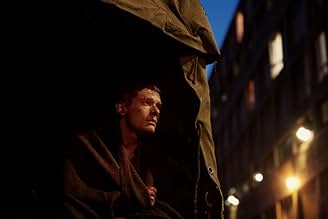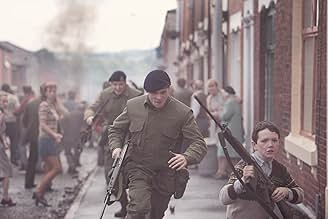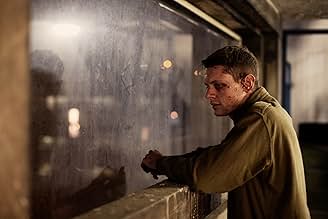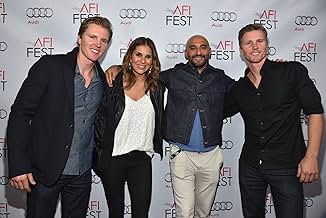En 1971, un joven y desorientado soldado británico es abandonado accidentalmente por su unidad tras una violenta revuelta en Belfast.En 1971, un joven y desorientado soldado británico es abandonado accidentalmente por su unidad tras una violenta revuelta en Belfast.En 1971, un joven y desorientado soldado británico es abandonado accidentalmente por su unidad tras una violenta revuelta en Belfast.
- Dirección
- Guionista
- Elenco
- Nominada a2premios BAFTA
- 14 premios ganados y 31 nominaciones en total
- Dirección
- Guionista
- Todo el elenco y el equipo
- Producción, taquilla y más en IMDbPro
Opiniones destacadas
It took me a while to finally give this film a chance, but I actually do not regret watching it. It was enjoyable, had a great pace, and had enough unexpected twists and turns to keep you guessing. The movie was also full of characters who seemed weak but faced stressful situations that they did not look like handling, and that created a lot of tension in the movie. An element, as I always say, essential if you are to like a movie. Being a foreigner, I don't know if this is based on real events, but either way, I thought the movie was definitely better than the rating its given. I have seen a lot worse with ratings of 8 or above on IMDb.
I tend to avoid most celluloid representations of Northern Irish Troubles - the longest running terrorist campaign in Europe, costing approximately 3000 lives and hundreds of millions of pounds in property damage and displacement - as oversimplified, glossy and biast; The Devil's Own, The Jackal, The Sons of Anarchy (particularly the last) portray Belfast either as some kind of South Central Los Angeles, or a gaudy Roger and Hammerstein set, with preconceived
notions of The Troubles, and frankly unrealistically romantic portrayals of (usually Republican) paramilitaries.
'71 offers a gritty change of direction and pace. Told from the bewildered (and bewildering) viewpoint of one Gary Hook (an excellent portrayal by Jack O'Connell), a young British Army private marooned in Belfast - he's still in the UK his mates are assured! - after a supposedly straightforward raid goes drastically wrong; we're sucked nto a grimy, claustrophobic race for survival; Gary's race is our race. Hotly pursued by a Provo hit squad, Gary soon learns shocking lessons about trust...
Perhaps the thriller element does get somewhat overdone - not as much as Fifty Dead Men Walking, mark - but I was genuinely impressed at the attempt made to grasp the nettle of the turmoil in the early Seventies and break it down for the outsider; how often has the Official v Provisional split been discussed or portrayed in film? The Loyalists are mostly comic relief, but an attempt is made to portray them as real people...just like the ordinary Catholics who risk their lives to aid the stiken Gary.
Sean Harris deserves a mention as the devious Military Reaction Force officer (a real undercover outfit) running numerous Protestant and Catholic players; and contrary to some reviewers, barricades and vigilante patrols were fairly common during the early part of the decade - did he never hear of Free Derry?
This is an honest attempt to unravel the confusion of Ulster's tragedy for the perspective of a confused outsider, particularly a lone British soldier; it deserves praise for its insight and bravery.
'71 offers a gritty change of direction and pace. Told from the bewildered (and bewildering) viewpoint of one Gary Hook (an excellent portrayal by Jack O'Connell), a young British Army private marooned in Belfast - he's still in the UK his mates are assured! - after a supposedly straightforward raid goes drastically wrong; we're sucked nto a grimy, claustrophobic race for survival; Gary's race is our race. Hotly pursued by a Provo hit squad, Gary soon learns shocking lessons about trust...
Perhaps the thriller element does get somewhat overdone - not as much as Fifty Dead Men Walking, mark - but I was genuinely impressed at the attempt made to grasp the nettle of the turmoil in the early Seventies and break it down for the outsider; how often has the Official v Provisional split been discussed or portrayed in film? The Loyalists are mostly comic relief, but an attempt is made to portray them as real people...just like the ordinary Catholics who risk their lives to aid the stiken Gary.
Sean Harris deserves a mention as the devious Military Reaction Force officer (a real undercover outfit) running numerous Protestant and Catholic players; and contrary to some reviewers, barricades and vigilante patrols were fairly common during the early part of the decade - did he never hear of Free Derry?
This is an honest attempt to unravel the confusion of Ulster's tragedy for the perspective of a confused outsider, particularly a lone British soldier; it deserves praise for its insight and bravery.
War tends to find its way in movies the way a car chase, love triangle or training sequence does, as a backdrop for profound introspection (Apocalypse Now) or profound absurdity (Battleship). '71, directed by Yann Demange, which screened at the New York Film Festival, does not concern itself with the impossibility of unraveling the politics behind violence, or implant an over-the- top action sequence, but uses the Northern Ireland conflict of the late 60's and early 70's as context, not base.
The Catholic/ Protestant, or even English/ Irish conflict is not covered in great detail which allows the film to construct its own sensibility: a netherworld where an English soldier sent to Belfast, Gary Hook (Jack O'Connell), must find trust and a way back. Houses are not homes, but bunkers for families supposedly hiding guns and trying to raise children. Bombs are the weapons of choice and children are the only ones with answers, creating a sci-fi texture to the film. This is a thriller and the plot is something you can find out about when you actually see the movie.
War, conflict (whatever you want to call killing a bunch of people) is an abyss not just of death, but of trust—who values my life? No one. Yet Demange does not attempt to make an affected statement about war, and focuses on the grey of the conflict with Gary as his sharp, contrasting center. As Gary slowly emerges through the desolate streets of Belfast he is greeted by a boy (Corey McKinley) who seems to be his only salvation. The boy struts, demanding respect as he cusses out his fellow "comrades" in a scene that could be strait out of Blade Runner.
During the Q&A after the film Demange recalled not wanting McKinley to rehearse too much, he didn't want an actor, but a real boy who in such a setting needs an armor of bravado to stay alive. McKinley, who Demange found at a boxing ring (he's 9), preferred boxing to rehearsing in between scenes, and it paid off. Besides O'Connell McKinley is the most memorable actor in the film. O'Connell, who made a mark with This is England and the series Skins, recently burst into films consciousness with the prison drama Starred Up, and is about to find himself in epic American waters with Angelina Jolie's directorial debut Unbroken. At only twenty-four years of age O'Connell has managed to create a provoking and mature persona. With a gruff low voice and edgy exterior, O'Connell brings a swagger which is unparalleled as almost every scene belongs to him and the film works because of him.
I am a bit afraid after his American debut, O'Connell will somehow loose his edge, but he comes across as smarted than the Hollywood unconsciousness. He has a lot to give us and this is only the beginning, handle with care (300: Rise of an Empire, yeah he's in that). Although thrillers tend not to be my cup of tea, I like developed characters and layers of plot—'71 takes place in the span of 24 hours—it is still an exceptional piece mainly due to O'Connell's masterful performance, Demange's restrained direction and Tat Radcliffe's stylized cinematography.
'71 is still making the festival rounds and does not yet have a U.S. release date, but will be released in the U.K. on October 10th.
@MeMontgom filmnoises.com
The Catholic/ Protestant, or even English/ Irish conflict is not covered in great detail which allows the film to construct its own sensibility: a netherworld where an English soldier sent to Belfast, Gary Hook (Jack O'Connell), must find trust and a way back. Houses are not homes, but bunkers for families supposedly hiding guns and trying to raise children. Bombs are the weapons of choice and children are the only ones with answers, creating a sci-fi texture to the film. This is a thriller and the plot is something you can find out about when you actually see the movie.
War, conflict (whatever you want to call killing a bunch of people) is an abyss not just of death, but of trust—who values my life? No one. Yet Demange does not attempt to make an affected statement about war, and focuses on the grey of the conflict with Gary as his sharp, contrasting center. As Gary slowly emerges through the desolate streets of Belfast he is greeted by a boy (Corey McKinley) who seems to be his only salvation. The boy struts, demanding respect as he cusses out his fellow "comrades" in a scene that could be strait out of Blade Runner.
During the Q&A after the film Demange recalled not wanting McKinley to rehearse too much, he didn't want an actor, but a real boy who in such a setting needs an armor of bravado to stay alive. McKinley, who Demange found at a boxing ring (he's 9), preferred boxing to rehearsing in between scenes, and it paid off. Besides O'Connell McKinley is the most memorable actor in the film. O'Connell, who made a mark with This is England and the series Skins, recently burst into films consciousness with the prison drama Starred Up, and is about to find himself in epic American waters with Angelina Jolie's directorial debut Unbroken. At only twenty-four years of age O'Connell has managed to create a provoking and mature persona. With a gruff low voice and edgy exterior, O'Connell brings a swagger which is unparalleled as almost every scene belongs to him and the film works because of him.
I am a bit afraid after his American debut, O'Connell will somehow loose his edge, but he comes across as smarted than the Hollywood unconsciousness. He has a lot to give us and this is only the beginning, handle with care (300: Rise of an Empire, yeah he's in that). Although thrillers tend not to be my cup of tea, I like developed characters and layers of plot—'71 takes place in the span of 24 hours—it is still an exceptional piece mainly due to O'Connell's masterful performance, Demange's restrained direction and Tat Radcliffe's stylized cinematography.
'71 is still making the festival rounds and does not yet have a U.S. release date, but will be released in the U.K. on October 10th.
@MeMontgom filmnoises.com
Understanding the intricacies of the Troubles is by no means an easy task, but director Yann Demange has done an excellent job of presenting this conflict in '71. Demange made something of a name for himself on British television, directing the E4 horror series Dead Set and Channel 4 crime drama Top Boy, and this success has translated very well into a film with much larger political significance.
The characters of '71 are very much forged by their on-screen experience. Little backstory is given to the protagonist, Gary Hook, portrayed by Jack O'Connell, yet he gives a compelling physical and visual performance with an almost empty script. The intimate, personal atmosphere of the film makes the political conflict much easier to grasp for the viewer and the diversity of the opposing factions and characters shines through with an excellent supporting cast.
The only flaw I could find in the film is its difficulty in exploring the "why" behind the conflict we witness on our screens. This in itself may play into the story, however, as British soldiers expecting to be sent abroad found themselves much closer to home, in a conflict they themselves didn't fully understand.
The Troubles are a criminally under-taught and under-represented period so '71 offers an intriguing glimpse into the unrest and disorder that regrettably continues to this day.
The characters of '71 are very much forged by their on-screen experience. Little backstory is given to the protagonist, Gary Hook, portrayed by Jack O'Connell, yet he gives a compelling physical and visual performance with an almost empty script. The intimate, personal atmosphere of the film makes the political conflict much easier to grasp for the viewer and the diversity of the opposing factions and characters shines through with an excellent supporting cast.
The only flaw I could find in the film is its difficulty in exploring the "why" behind the conflict we witness on our screens. This in itself may play into the story, however, as British soldiers expecting to be sent abroad found themselves much closer to home, in a conflict they themselves didn't fully understand.
The Troubles are a criminally under-taught and under-represented period so '71 offers an intriguing glimpse into the unrest and disorder that regrettably continues to this day.
In 1971 I was living on the fringes of Derry's Bogside. On several occasions my home was 'collateral damage' in a number of bombings and I remember lying on the floor of my bedroom in case I might fall victim to a stray bullet from one of the gun-battles raging outside. I drank in pubs that would be bombed in time and I was on the march on Bloody Sunday. Things were bad in Derry in 1971 but they were a lot worse in Belfast which is where and when Yann Demange's terrific movie "'71" is set. Maybe it's because I had first-hand experience but I've never really taken to films about 'the Troubles'. Irish film-makers have usually shied away from the subject, (a rare good exception being Jim Sheridan's "In the Name of the Father" and that was set mostly in England), leaving it up to the English and the Americans to tackle them, mostly ineptly, (exceptions again being Alan Clarke's made-for-television film "Elephant" and Steve McQueen's "Hunger"), so my expectations of "'71" were far from high, yet I believe this will be the film about the Northern Ireland 'Troubles' by which all others will be judged. Firstly nothing happens on screen that seems far-fetched or exaggerated, (and here is a film that doesn't pull its punches in showing the collusion between the British Government and paramilitaries on both sides). It's a film that could never have been made in the seventies and even 20 years ago it would have been banned here in Northern Ireland. Politically, it's dynamite but it's as a nail-biting, nerve-shredding thriller that it really makes its mark. In may respects it's a very minimalist work, taking place almost entirely over the course of one night and is really made up of two lengthy set-pieces. It's about Private Hook, (a superb Jack O'Connell), a young British solider who, on his first day of active service in Belfast, is separated from his platoon and forced to go on the run in a totally alien landscape where he is seen as 'the enemy' to be hunted down and killed. We've seen this story before. In "Odd Man Out" James Mason was the IRA man on the run in an equally treacherous Belfast but as they say, it's a tale as old as time. Outstanding American examples have included "Deliverance" and "Southern Comfort", albeit in very different settings, but few have packed the punch of "'71"; this is a terrifyingly tense thriller.
It's also the feature debut of Yann Demange who handles the material with all the assurance of a Paul Greengrass. He shoots it as if it were a newsreel, using mostly a hand-held camera, (the DoP is Tat Radcliffe), putting the audience in the centre of things. For once, all the performances are superb. In the past actors playing either Ulstermen or the occupying forces have often been reduced to nothing more than mouth-pieces; not here. Everyone on screen is utterly believable. This is one of the finest films you will see all year.
It's also the feature debut of Yann Demange who handles the material with all the assurance of a Paul Greengrass. He shoots it as if it were a newsreel, using mostly a hand-held camera, (the DoP is Tat Radcliffe), putting the audience in the centre of things. For once, all the performances are superb. In the past actors playing either Ulstermen or the occupying forces have often been reduced to nothing more than mouth-pieces; not here. Everyone on screen is utterly believable. This is one of the finest films you will see all year.
¿Sabías que…?
- TriviaMost scenes were shot in Northern England.
- ErroresIn the initial chase scene where Gary runs from the shooter he is fired at 32 times (including the first kill shot) from what seems like just one man's gun, we don't see the younger boy fire his gun at all. We also don't see any reloading as they are running at breakneck speed. This would be impossible from a small 1960's era 9mm Semi-automatic pistol which have at most 13 rounds in the magazine.
- ConexionesFeatured in Projector: The Imitation Game/'71 (2014)
- Bandas sonorasTHE SKY IS CRYING
Written and Performed by Elmore James
Published by EMI Music Publishing Limited
Courtesy of Sony Music Entertainment Inc
Selecciones populares
Inicia sesión para calificar y agrega a la lista de videos para obtener recomendaciones personalizadas
- How long is '71?Con tecnología de Alexa
Detalles
- Fecha de lanzamiento
- País de origen
- Idioma
- También se conoce como
- Seventy One
- Locaciones de filmación
- Productoras
- Ver más créditos de la compañía en IMDbPro
Taquilla
- Total en EE. UU. y Canadá
- USD 1,270,847
- Fin de semana de estreno en EE. UU. y Canadá
- USD 55,761
- 1 mar 2015
- Total a nivel mundial
- USD 3,062,178
- Tiempo de ejecución1 hora 39 minutos
- Color
- Mezcla de sonido
- Relación de aspecto
- 2.39 : 1
Contribuir a esta página
Sugiere una edición o agrega el contenido que falta







































